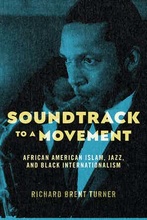
Congratulations to Dr. Richard Turner on his newly published book titled, "Soundtrack to a Movement: African American, Islam, Jazz, and Black Internationalism". The book is available for purchase through New York University Press.
Description
Explores how jazz helped propel the rise of African American Islam during the era of global Black liberation. Amid the social change and liberation of the civil rights and Black Power movements, the tenor saxophonist Archie Shepp recorded a tribute to Malcolm X’s emancipatory political consciousness. Shepp saw similarities between his revolutionary hero and John Coltrane, one of the most influential jazz musicians of the era. Later, the esteemed trumpeter Miles Davis echoed Shepp’s sentiment, recognizing that Coltrane’s music represented the very passion, rage, rebellion, and love that Malcolm X preached.
Soundtrack to a Movement examines the link between the revolutionary Black Islam of the post-WWII generation and jazz music. It argues that from the late 1940s and ’50s though the 1970s, Islam rose in prominence among African Americans in part because of the embrace of the religion among jazz musicians. The book demonstrates that the values that Islam and jazz shared—Black affirmation, freedom, and self-determination—were key to the growth of African American Islamic communities, and that it was jazz musicians who led the way in shaping encounters with Islam as they developed a Black Atlantic “cool” that shaped both Black religion and jazz styles.
Soundtrack to a Movement demonstrates how by expressing their values through the rejection of systemic racism, the construction of Black notions of masculinity and femininity, and the development of an African American religious internationalism, both jazz musicians and Black Muslims engaged with a global Black consciousness and interconnected resistance movements in the African diaspora and Africa.
Reviews
"A tour de force of interdisciplinary research that identifies, explains, and analyzes previously underexplored links between expressive culture and social identities. For both expert and novice readers, African American Islam and Jazz is filled with delightful surprises. Turner’s chapters on Black urban life in Boston and Philadelphia delineate the rich social and historical contexts out of which the musical texts of bebop music emerged. His careful attention to empirical detail reveals southern and Caribbean migrants to these cities to have been neither ruthlessly uprooted nor seamlessly transplanted, but instead positioned inside complex struggles for self-defense, self-determination, and self-activity." ~George Lipsitz, author of How Racism Takes Places
"Turner's powerful and well-written book taught me new things on just about every single page, new things about jazz much, about Islam in America, and about how those two spheres intersected in the lives and experiences of African Americans. Spanning several decades in the exploits and activities of various Islamic groups, as well as some canonical African American figures, this book provides us with a distinctively new soundtrack for the stories we tell ourselves about black political and religious life. This outstanding offering that will be valued by readers interested in religion, popular music, and/or African American life." ~John L. Jackson, Jr., co-author of Televised